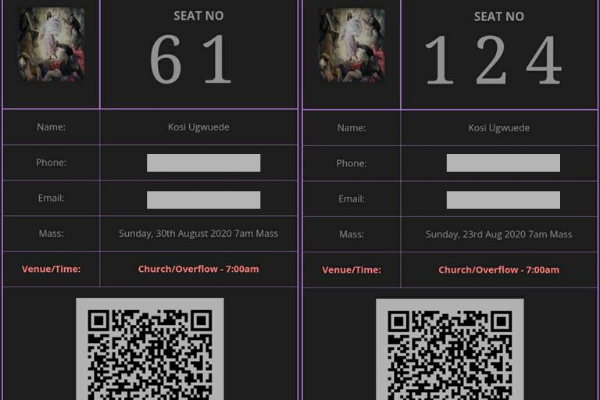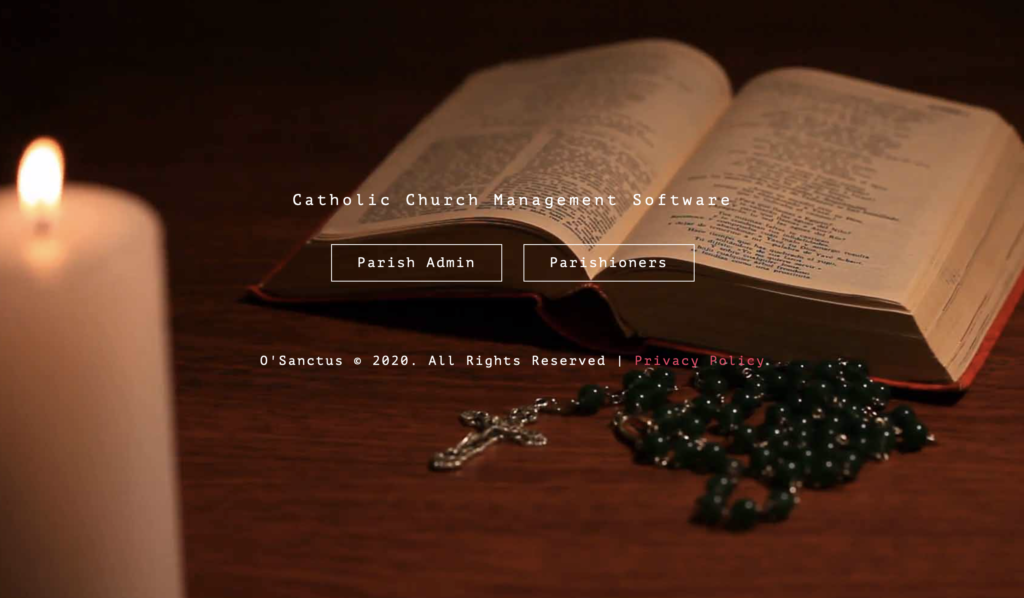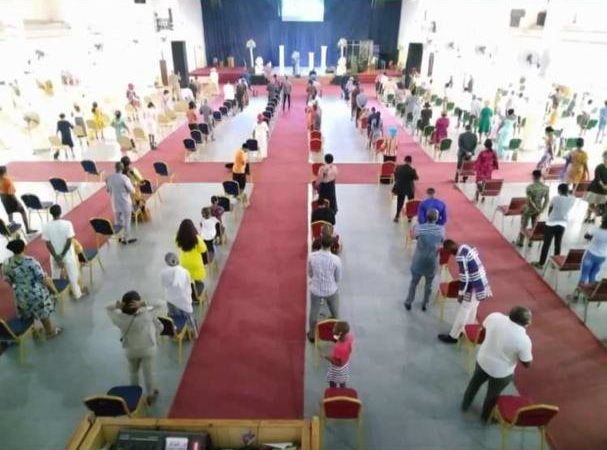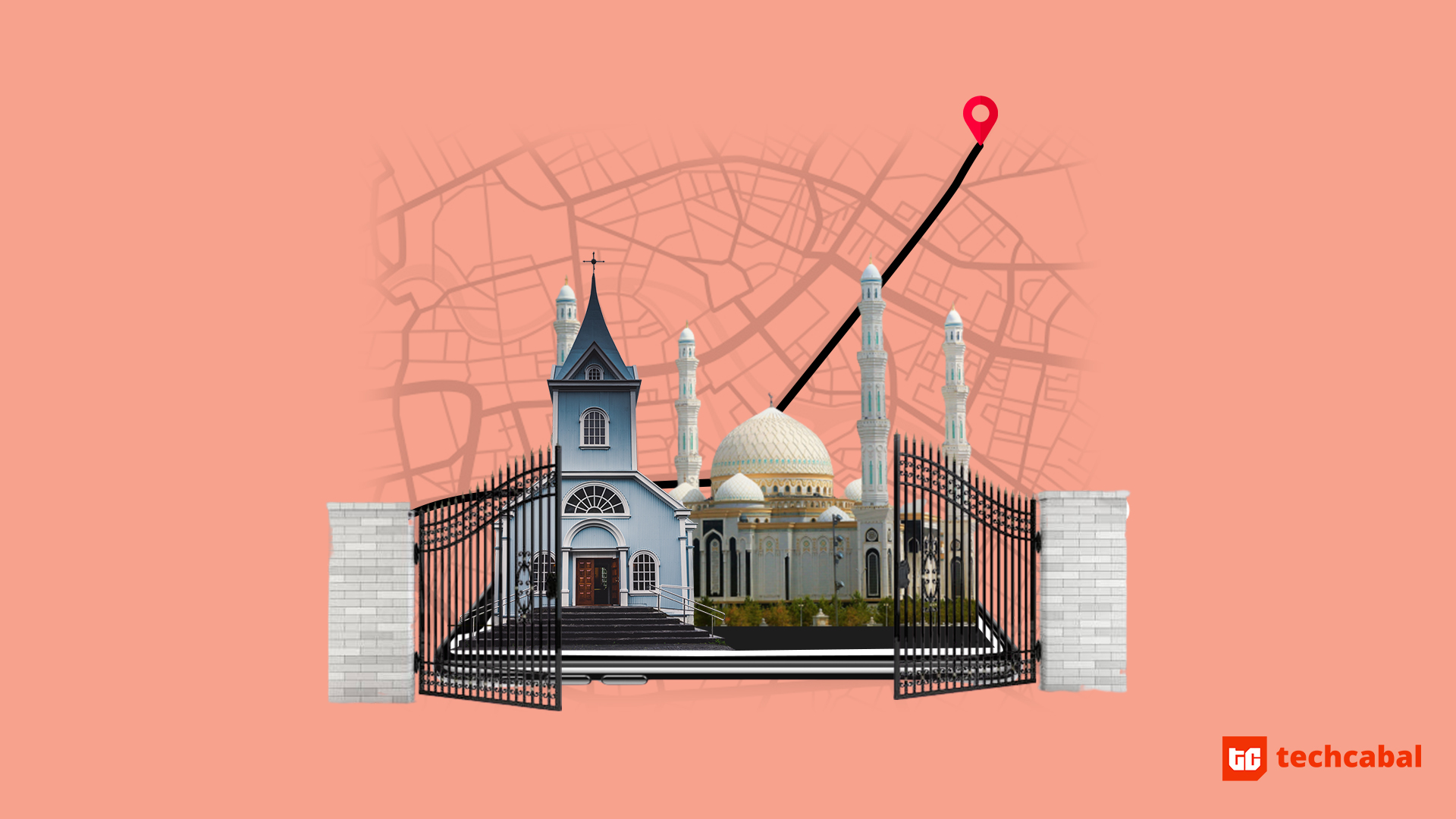As we drive into the Victoria Garden City estate gate in Lagos, Nigeria, there is very little that suggests it is a Sunday. The streets are not lined with cars or churchgoers making their way on foot to any of the 3-4 churches along the street. Speakers aren’t blaring gospel tunes from exuberant choirs. There are no men in neon green vests trying to manage the flow of people and traffic.
At the end of the street, masked parishioners trickle into the Catholic Church of Transfiguration for a 7:00am mass. At the gate, a warden points a temperature stick at their foreheads, squirts a dollop of sanitiser into their hands and asks for their attendance registration.
A confirmation is acknowledged with a glance at screenshots from a mobile app/web platform. The screen shot bears the name of the parishioner, their email address, seat number and a QR code.

Inside, another warden asks for seat numbers and points parishioners to one of six seating areas that have been created since masses resumed. In the main church hall, only three people are allowed on a pew and the pews are empty at intervals. In the sitting area two floors above where we wait for mass to begin, chairs have been numbered and positioned six feet apart like in a strict examination hall. A large projector screen at the center of the hall and an adjacent television screen transmits the altar to us from the ground floor.
Since March, churches, mosques and other religious places of worship across the country have had to move their activities online due to the coronavirus outbreak. YouTube, Facebook, WhatsApp or Instagram Live services have gone on for months, most of them broadcast from empty church auditoriums to thousands of faithfuls in the country and around the world. Funerals have been organised online, as have wedding ceremonies and christenings.
But Nigeria is a hyper religious state and it was not long before church leaders and members began to agitate to return to physical services.
“Now, freedom of worship is no longer a constitutional right but now determined by some individuals,” said Bishop David Oyedepo, founder of Living Faith Tabernacle, one of the country’s most populous churches, after the Lagos state government began easing lockdowns for businesses and corporate workers.
“It is a hard thing to kick against the priest. This is no longer coronavirus in Lagos and Ogun. It is now anti-church virus clean and clear,” he said during a sermon in June.
Following its announcement that places of worship were going to resume in June, the Lagos state government put the plans on hold “till further notice” citing the rising increase in cases and the halfhearted stance of Lagosians to social distancing and mask wearing injunctions since the lockdowns were eased.
“If offices and businesses could be opened with safety measures put in place, we believe that the same principle ought to apply to Churches with higher chances of better compliance,” the Catholic Archbishop of the Lagos Diocese, Archbishop Alfred Adewale Martins, said in response to the shift in dates.
At over 17,000 cases, Lagos state has been the worst hit of Nigeria’s 36 states since the coronavirus pandemic ensued.
But now, religious activities have been allowed to commence, and navigating church attendance will be a huge determinant of how safely this sorely missed part of daily life can continue.
For the millions of Nigeria’s teeming religious, attending weekly services can be as simple as showing up to the mosque or church without any pre-information of one’s presence to the church’s administration.
But that is changing.
On the O’Sanctus web platform and mobile, parishioners from churches across some deaneries on the Lagos island are organising mass attendance.

Parishioners sign up and create profiles on the app. In addition to being able to book masses, make offerings/donations and book appointments with their parish priests, the app has become a very important tool in predetermining and restricting the number of attendees per mass to ensure that social distancing measures are in place.
The app was created in 2019 by Applus Dome Limited to help churches organise their activities digitally but its use really picked up this year with the coronavirus pandemic.
At Holy Family Catholic Church in Festac Town, parishioners pre-register their attendance on the church’s website.
While some parishes like St. Peter and Paul, Somolu, have no apps or web platforms to pre-register mass attendance, a parishioner tells TechCabal that all precautionary measures are in place and once the recommended church capacity is reached, no one is allowed into the halls.
“Anybody above 65 and below 15 is sent back,” she says, “ and after mass, no one enters until the place is sanitized for the next mass.”
Masses are still streamed Live across the state or available to watch later.
Nigeria’s megachurches with auditoriums that sit people in the thousands are navigating the reopenings differently.
The Redeemed Christian Church of God (RCCG) is one of such mega churches with 23,880 parishes across Nigeria. A member at the Ikeja parish in the Lagos mainland said that while there is no pre-registration to attend services, members are mandated to register when they arrive at the parish for contact tracing measures. This process is manual.
On a normal day, the main church can seat about 1,500 people but only about half of that number can attend currently. Services are also still going on online.

Oyedeopo’s Living Faith Tabernacle resumed services on August 23 at the church’s 50,000 capacity auditorium which looked somewhat packed although members sat one chair away from each other.
Churches like Daystar Christian Center and House on the Rock whose auditorium has a 10,000 seating capacity, have said they will continue to hold services online for the safety of their members.
Imam Nojeem Jimoh who has been navigating the pandemic via Zoom says his Masjid remains closed but prayers have resumed under outside tents that ensure social distancing. Two other Muslims who spoke with TechCabal say they are yet to resume congregational prayers at the mosques.
Some others have moved their opening dates to September to give time to ensure that distancing and safety rules are adhered to while others are eschewing the Lagos state’s injunction and awaiting a directive from heaven.
Digital tools have assisted an intensely religious society keep up with their faiths at a time when it can be said to be needed the most.
Part of the Lagos state government’s conditions for places of worship reopening in its August 2 circular, was to allow only regular services commence; for places of worship to ensure that contactless temperature checks and sanitary conditions be met including regular disinfection of service spaces and halls.
“The flow of human traffic in and out of these places of worship must be conducted in an organized and orderly manner,” the circular also said and adoption of apps and web platforms that allow for this ordeliness must be encouraged especially for places of worship yet to reopen.
This schedule-keeping digitally will also allow for ease with contact tracing in the event that it becomes necessary.
While some men of God have claimed to have miraculously healed coronavirus patients in the last few months, the rising number of cases in Lagos and around the country; recent news of possible reinfections, continue to serve as cautionary tales.
We must resume living all aspects of our lives with caution and care for ourselves, and the persons with whom we share our existence, spaces and faiths with.















